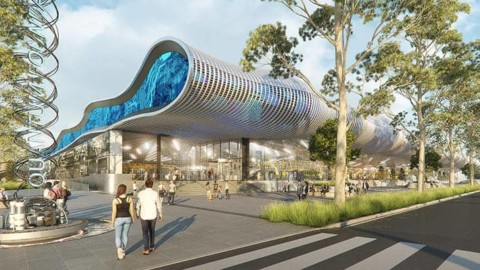The Queensland Government-owned North Queensland Bulk Ports Corporation (NQBP) has signed a memorandum of understanding (MoU) with global and local partners for a proposed hydrogen export facility at the Port of Hay Point, south of Mackay.
NQBP joined Dalrymple Bay Infrastructure, Brookfield, and international trading company ITOCHU Corporation to sign a memorandum of understanding (MoU) for the hydrogen proposal.
The MoU will allow for work to start on concepts to build a renewable hydrogen production, storage, and export facility within the Hay Point port precinct.
Dalrymple Bay Terminal is attracting interest as a green hydrogen production base due to its location in the centre of a Renewable Energy Zone, designated by the Queensland Government.
The feasibility study will be conducted in phases, up to the final commercial production phase, with Phase I scheduled to begin during 2021.
NQBP CEO, Nicolas Fertin, said NQBP is excited to work with existing stakeholders and new proponents and explore opportunities for hydrogen at Hay Point.
“As part of our planning, we want to ensure new trades such as hydrogen can co-exist at our ports alongside our existing trades,” Mr Fertin said.
“This is part of preparing for the decarbonisation of overseas industries and markets so that our ports can support the potential development of new trades that foster the economic development of our region.”
Queensland Minister for Energy, Renewables and Hydrogen, Mick de Brenni, said the Queensland Government’s focus on renewable energy, hydrogen and manufacturing was part of Queensland’s COVID-19 economic recovery plan.
“That plan is about supporting regional economies through targeted investments that support job-creation and workforce development,” Mr de Brenni said.
“Hydrogen presents an incredible opportunity to create jobs and decarbonise our economy.
“Our $2 billion Renewable Energy and Hydrogen Jobs Fund is about working with industry to encourage investment in emerging industries like hydrogen.
“We’ve demonstrated our commitment to that end by backing a plan and securing a site for a three-gigawatt renewable hydrogen facility in Aldoga, west of Gladstone.
“We’re supporting studies to establish a renewable hydrogen demonstration plant next to Kogan Creek Power Station near Chinchilla.”
Mr de Brenni said that the Queensland Government is also working with business groups to develop local workforce capability and supply chains in hydrogen, as done previously with the state’s global liquefied natural gas export industry.
Queensland Transport and Main Roads Minister, Mark Bailey, said Queensland’s publicly-owned ports needed to be ready to capitalise on the future demand for exported hydrogen from international trading partners.
“Queensland is already a leading energy exporter and the world is now looking to us to become a leading producer of hydrogen as the next energy source,” Mr Bailey said.
“Renewable hydrogen can be stored and used over time, and, as a future fuel source, is one of the most promising solutions for reducing global emissions, particularly in the transport and heavy industry sectors.
“Earlier this year, we signed an agreement to develop a liquid hydrogen facility at the Port of Townsville.
“Hay Point is a critical part of our state’s supply chain and Queensland’s economy, connecting regional Queensland to power, food and steel industries in Asia.
“Agreements like this allow us to prepare the port to meet the energy needs of developing industries across the globe.”
Member for Mackay Julieanne Gilbert, said the move to investigate hydrogen production and exports was positive news for jobs in the Mackay region.
“More than 20,000 mining, farming and transport jobs are supported by the trade that passes through Hay Point,” Mrs Gilbert said.
“Hay Point makes an incredibly important contribution to our state’s economy, so this agreement will ensure the port is well positioned to take advantage of new export opportunities that arise on the back of investment in Queensland’s energy sector.”
Mr Fertin said the MoU was a first step in what would be a thorough and considered process.
“We are at an early stage of possible developments, with future steps involving further feasibility studies, consulting with community, traditional owners and regulators.”

















